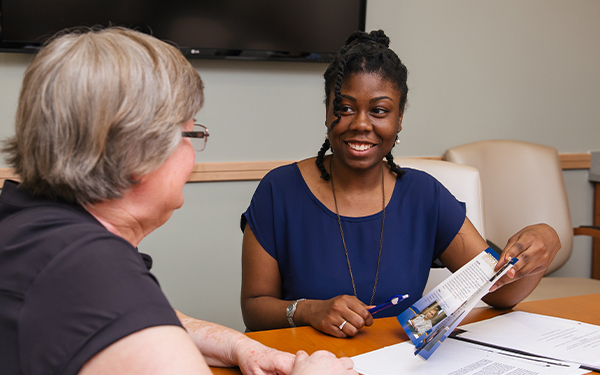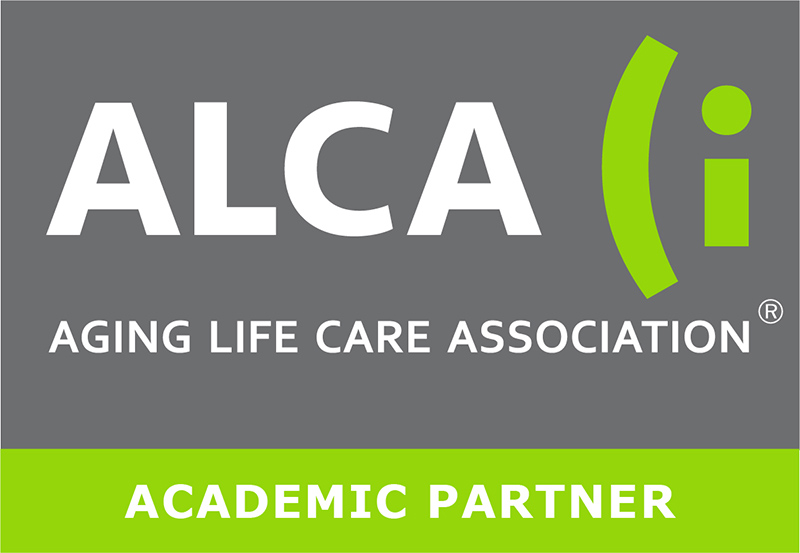GSW Website Search
- Apply
- About
- Academics
- Admissions
- Financial Aid
- Athletics
- Student Life
- myGSW
- A-Z Index
- Directory
- Map
- Visit
- Give
The Bachelor of Science in Long-Term Care Management (LTCM) is an interdisciplinary degree which prepares graduates to assist patients and families to connect with community resources, transition from hospital to home, and manage the care of residents in an institutional setting. Offered online and in the classroom settings, students take courses from a variety of disciplines: sociology, psychology, business, nursing, and the caregiving institute.
Employers today express the need for a new skillset in their workforce. They are looking for individuals who are compassionate, culturally sensitive, have managerial skills, and the ability to communicate well with others. The LTCM Degree prepares graduates to assist patients and families to connect with community resources, transition from hospital to home, and manage the care of residents in an institutional setting with careers such as:
Our graduates are not only navigating today’s complex healthcare system—they’re shaping the future of care. Hear their stories of success:
"My LTCM degree has allowed me to enter into a newly created position within the Case Management department in our local hospital."
– Debra Stanfield, Graduate 2021
"Attaining a Long-Term Care Management degree has set me up to move forward in becoming a great nursing home administrator in the future."
– Flora Ampofo, 2024
Bachelor of Science in Long-Term Care Management
College of Nursing & Health Sciences
Carter I
229-931-2670
leisa.easom@gsw.edu
The role of a care manager is to navigate the healthcare system by:
The LTCM Program teaches students to navigate the healthcare pathway for clients and their families. Skills include managing budgets, assisting with transitioning from hospital to home, arranging transportation for health care visits, connecting families to support systems in their community, assisting with insurance management
We are at a national high with Alzheimer's disease and related dementia with 1 in 10 adults in the U.S. age 65 and over being diagnosed. Georgia is the 11th state with the fastest growing older adult population and had a 50% increase from 2005-2015. More than 5 million Americans are living with Alzheimer's. This number could reach 16 million by 2050.
The need for critical care workers at an all-time high and projected to grow 32% from 2019 to 2029.
Georgia Southwestern has a total of eight partnerships with other schools to encourage a seamless transfer of credits into the Long-Term Care Management program. Current schools include:
Transfer credits are evaluated within the Office of Registrar. Students can review course transferability with our Transfer Articulation.
Yes! Classes are offered in-person and online providing for flexibility and convenience for non-traditional students. Courses may be accessed from anywhere, providing flexibility and convenience for non-traditional students. Classroom settings are also available for some classes.

Students will be required to complete a 180 hour internship to encourage student growth by applying classroom theory to the “real world” setting in the field.
An integral component of LTCM 4001 course (9 academic credit hours) is the 180 hour internship experience. This internship is designed to be a capstone experience and taken toward the end of completion of the Long-Term Care Management Degree.
The student is ultimately responsible for finding the location and agency where you will do your internship. Once your academic advisor has approved your site selection, you must bring the completed clinical initiation form to the clinical coordinator by the deadlines posted on the checklist in the internship guide. The Clinical Coordinator will determine the credentialing requirements (ex. Drug test, CPR certification, immunizations, etc.) of your chosen agency. All students must purchase liability insurance. See the checklist below in the Internship Guide.
This guide has been prepared to assist students, faculty, administration and partnering agencies in understanding the purpose of the internship, the associated learning objectives, and facilitating student learning and successful outcomes in this experience.
To encourage student growth by applying classroom theory to the “real world” setting in the field. Specifically, students will gain knowledge of the duties, the responsibilities, and the nature of a career in a long term care setting.
The success of the internship depends greatly upon the student’s realization of responsibilities. The student’s activities should reflect the policies and standards of both the agency and the University. During the internship, the student becomes a functional part of the agency completing 180 hours over the course of the semester.
Students in the internship experience must carry liability insurance. The semester prior to the internship, students should access the insurance site at www.HPSO.com, then click on "Get A Quote" then "individual", then click on "student". You will then enter your state of residence, then type in the Field of Study as "Geriatric Care Manager", type in anticipated date of graduation, then continue. Complete fields as required for student information. Students need to be prepared to pay with a debit or credit card that has their name on the card and insurance proof is available within 24 hours. If the student is not prepared to pay in this manner, they must download the paper copy and submit as instructed which may take up to two weeks to process. Turn in proof of liability insurance to Ms. Andrea Pinckard.
Meet with your faculty adviser for approval of your site choice. It is strongly suggested that you start this process at least 5-6 months prior to the time you intend to start your internship.
Submit your signed Clinical Initiation Form and HS Field-Experience Conduct Agreement to the Clinical Coordinator by the posted deadlines.
See Mrs. Andrea Pinckard in College of Nursing and Health Sciences, Room 229
The Clinical Coordinator will determine facility requirements and notify student of requirements and if application to ACEMAPP is needed:
GSW has an academic partnership with Aging Life Care Association (ALCA) which is a national organization who leads the community of Aging Life Care Professionals® through education, professional development, and the highest ethical standards. An Aging Life Care Professional is a health and human services specialist who acts as a guide and advocate for families who are caring for older relatives or disabled adults. The academic partnership with ALCA demonstrates a relationship to the national organization and provides a professional pathway for current students and graduates to seek national credentialing as a Certified Manager of Care.

Coming from a close-knit family, I really love how the community at GSW and in Americus resembles that. At GSW, I am able to make connections that are beneficial and lasting during college and in my post-college career.
